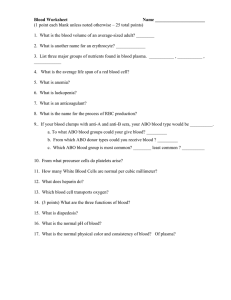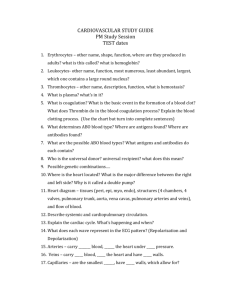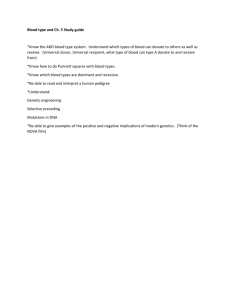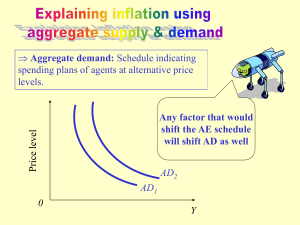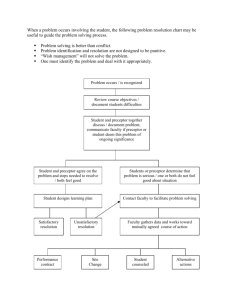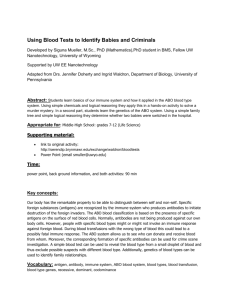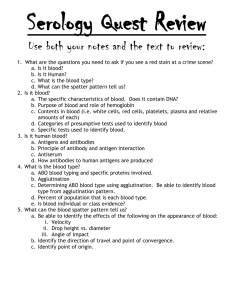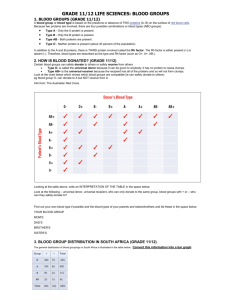WAYNE STATE UNIVERSITY
advertisement
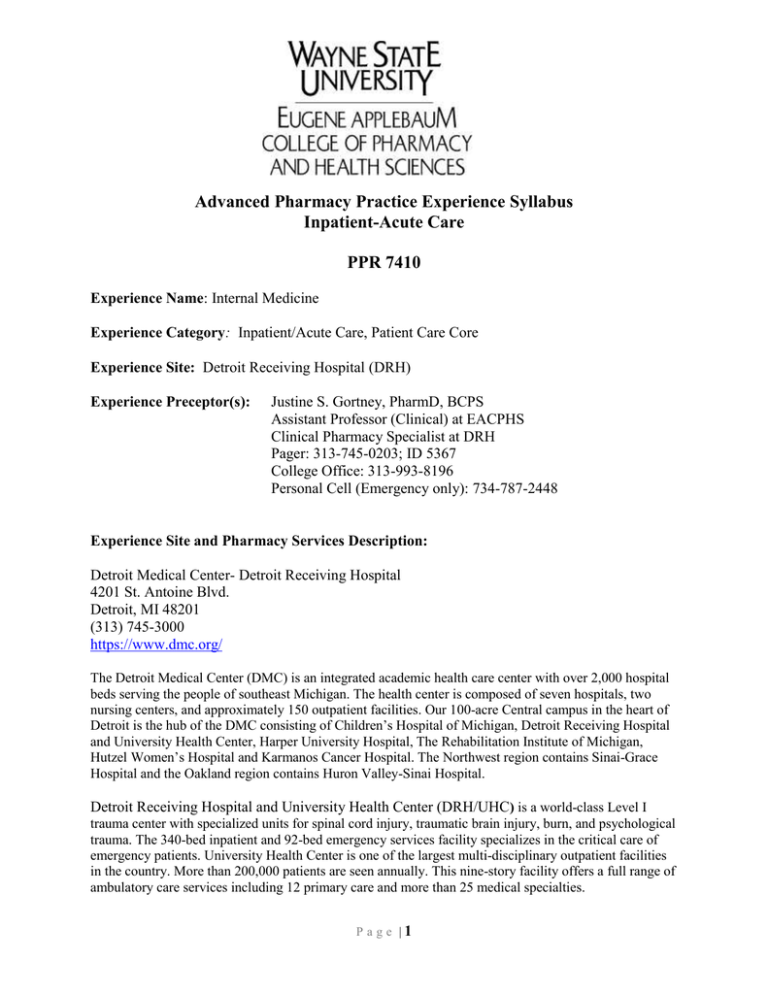
Advanced Pharmacy Practice Experience Syllabus Inpatient-Acute Care PPR 7410 Experience Name: Internal Medicine Experience Category: Inpatient/Acute Care, Patient Care Core Experience Site: Detroit Receiving Hospital (DRH) Experience Preceptor(s): Justine S. Gortney, PharmD, BCPS Assistant Professor (Clinical) at EACPHS Clinical Pharmacy Specialist at DRH Pager: 313-745-0203; ID 5367 College Office: 313-993-8196 Personal Cell (Emergency only): 734-787-2448 Experience Site and Pharmacy Services Description: Detroit Medical Center- Detroit Receiving Hospital 4201 St. Antoine Blvd. Detroit, MI 48201 (313) 745-3000 https://www.dmc.org/ The Detroit Medical Center (DMC) is an integrated academic health care center with over 2,000 hospital beds serving the people of southeast Michigan. The health center is composed of seven hospitals, two nursing centers, and approximately 150 outpatient facilities. Our 100-acre Central campus in the heart of Detroit is the hub of the DMC consisting of Children’s Hospital of Michigan, Detroit Receiving Hospital and University Health Center, Harper University Hospital, The Rehabilitation Institute of Michigan, Hutzel Women’s Hospital and Karmanos Cancer Hospital. The Northwest region contains Sinai-Grace Hospital and the Oakland region contains Huron Valley-Sinai Hospital. Detroit Receiving Hospital and University Health Center (DRH/UHC) is a world-class Level I trauma center with specialized units for spinal cord injury, traumatic brain injury, burn, and psychological trauma. The 340-bed inpatient and 92-bed emergency services facility specializes in the critical care of emergency patients. University Health Center is one of the largest multi-disciplinary outpatient facilities in the country. More than 200,000 patients are seen annually. This nine-story facility offers a full range of ambulatory care services including 12 primary care and more than 25 medical specialties. P age |1 Experience Description: This rotation will provide the APPE student an opportunity to participate in the medical management of acute care patients assigned to the medicine service at Detroit Receiving Hospital (DRH). There are four medicine teams at DRH, and the student will be assigned to one team for the duration of the rotation. Teams typically cover four to 15 patients and are responsible for the comprehensive care of the patient. The patient population is variable in age, gender, and ethnicity and common disease states include but are not limited to CAP, UTI, DFU, DM emergencies, VTE, HIV, asthma, COPD, pancreatitis, liver disease, atrial fibrillation, HF, HTN, HIV, and substance abuse. For assigned patients, the student will be responsible for comprehensive medication management and evaluation of the patient. As necessary, they will also participate in the provision of department of pharmacy services including pharmacokinetic dosing, anticoagulation, and patient counseling. Site hours may vary by day and load of patient care service, but are typically 7:30-5pm. Though the student will be assigned patients for comprehensive pharmacotherapy evaluation, it is expected that the student is aware of other patient needs on the team and evaluates the following parameters for every patient on the team prior to rounds: 1) 2) 3) 4) 5) Need for renal dose adjustment of drugs Criteria monitored drugs and microbiology data Eligibility for IV to PO switch Blood glucoses and insulin requirements Medications requiring pharmacy consult including drug administration within past 24 hours, day of therapy, and scheduled/obtained monitoring 6) Need for stress ulcer prophylaxis or VTE prophylaxis 7) PRN medication use of opiates, IV antiemetics, and antipsychotics Experience Competencies: 1. Gather, generate, and organize relevant patient or population specific data. (ABO 1.1) 2. Interpret relevant patient or population specific data. (ABO 1.2) 3. Identify pharmacotherapy problems. (ABO 1.3) 4. Work effectively as a member of an interprofessional team. (ABO 1.4) 5. Develop a therapeutic plan, utilizing a comprehensive knowledge of the biomedical and pharmaceutical sciences, evidence based literature, emerging technologies, and evolving changes in the health sciences. (ABO 1.5) 6. Incorporate the potential effects of the patient’s health literacy, psychosocial, economic, and cultural background into the therapeutic plan. (ABO 1.6) 7. Identify therapeutic outcomes. (ABO 1.7) 8. Implement the pharmacotherapeutic plan. (ABO 1.8) 9. Monitor outcomes and modify therapeutic plan as needed. (ABO 1.9) 10. Document pharmaceutical care activities and associated outcomes. (ABO 1.10) 11. Deliver comprehensive pharmaceutical care in a legal and ethical manner. (ABO 1.11) 12. Demonstrate professional skills, attitudes, and values and a sense of personal responsibility to patients, patients’ agents, and other health care providers. (ABO 1.13) 13. Manage a successful patient-centered practice (including being compensated for services and providing medication therapy management). (ABO 1.14) P age |2 14. Utilize informatics, epidemiologic and pharmacoeconomic data, medication-use criteria, medication use review and risk reduction strategies to develop disease prevention and management programs in order to provide patient and population based care. (ABO 1.15) 15. Retrieve, analyze and interpret scientific literature to disseminate drug information to patients, patients’ agents, health care professionals, administrators, policy makers, payers, and the public. (ABO 1.16) 16. Communicate effectively and persuasively with patients, patients’ agents, health care professionals, administrators, policy makers, payers and the public. (ABO 1.17) 17. Promote the availability of effective health and disease prevention services in a legal and ethical manner. (ABO 3.1) 18. Apply population specific data, quality assurance strategies, informatics and research processes to identify and resolve public health problems. (ABO 3.2) 19. Maintain professional competence by identifying and analyzing emerging issues, products, and services. (ABO 4.1) 20. Possess the skills and attitudes required to be a motivated, self-directed, independent, lifelong learner. (ABO 4.2) Experience Plan and Activities: This required practice experience is designed to give the student a basic understanding of disease states encountered in internal medicine. This course will stress the application of therapeutics in patient care and require the student to develop skills in taking medication histories, monitoring patients, participating in chart documentation and hospital programs, interacting with healthcare personnel of all disciplines, providing drug information, and patient education. Daily responsibilities will include individual patient evaluation, meeting with preceptor, and medicine team rounds. Based on a calendar of events, the student may participate (or present) in several other activities during the rotation including journal clubs, journal survey, formal patient case presentation, disease state discussions, and potentially MUE or research based activities (rotation specific) as determined by the preceptor. Requirements for specific events (if scheduled during rotation): A journal club article should be chosen from recent literature (last 6 months), be pertinent to an internal medicine topic, be of clinical research (primary literature) in nature, and from a reputable pharmacy or medical journal. The preceptor must approve chosen article at least one week prior to presentation. The article should be distributed to others a minimum of 3 days prior to the scheduled journal club discussion. When making a summary handout for the group, the handout may be a maximum of one page front and back. It is encouraged that students refer to tables and graphics in the article during the facilitation of discussion. A patient case presentation to an audience will be selected together by the preceptor and student. The presentation should be in PowerPoint format and should be 20 to 25 minutes in length as to allow time for questions. Handout materials should be provided to everyone attending. The presentation should include a title, learning objectives, patient based disease-state presentation, and references (listed in AJHP format). The presentation should be based on a patient case the student has followed and should include an overview of the patient case, presentation of drug-related problem or disease state and therapy, and its application to the P age |3 patient case. Topic with patient case should be submitted to the preceptor at least one week prior to presentation. Rules and Regulations: It will be expected that the student will follow the rules and regulations in relationship to conduct, patient confidentiality, and dress code as specified by both the Eugene Applebaum College of Pharmacy and Health Sciences and the Detroit Medical Center. Violations of such will be handled on an individual level in compliance with the Pharmacy Practice Experiences Policy and Procedures Manual for EACPHS and the College’s Code of Professionalism and Honor. Competencies for the Rotation: Competencies 1. Gather, generate, and organize relevant patient or population specific data. (ABO 1.1) Activities: For assigned patients identify relevant lab, medication administration, general monitoring, medication specific monitoring data and healthcare provider assessment/communication Access general and hospital-specific guidelines pertinent to care of assigned patients Participate in the identification and evaluation of patient data as required by MUE project or research. 2. Interpret relevant patient or population specific data. (ABO 1.2) Activities: Interpret culture and sensitivity data, drug levels, diagnostic test results, and other relevant laboratory data to evaluate such parameters as liver function, renal function, fluid status, acid/base balance, hematopoetic and coagulation status, and adverse reactions, Identify important deviation from the medication therapy plan and implementation Summarize the clinical problems, associations, and progression in response to treatment plan 3. Identify pharmacotherapy problems. (ABO 1.3) Activities: List the DRPs for each assigned patient 4. Work effectively as a member of an interprofessional team. (ABO 1.4) Activities: Attend team activities P age |4 Prepare for active participation in team activities Verbally communicate with team regarding care of assigned patients particularly as it relates to the medication therapy Respond to the questions and requests for information from the team 5. Develop a therapeutic plan, utilizing a comprehensive knowledge of the biomedical and pharmaceutical sciences, evidence based literature, emerging technologies, and evolving changes in the health sciences. (ABO 1.5) Activities: Develop a plan for each DRP that includes the therapeutic goal, specific therapy, and monitoring parameters (what, when, frequency and target/endpoint) Provide or site literature to support the plan Demonstrate comprehension of the clinical problems and pharmacotherapy for assigned patients and in general for patients commonly seen in this clinical setting. Demonstrate comprehension of the application of the pharmacotherapy and applicable treatment guidelines specific to the clinical factors of assigned patients 6. Incorporate the potential effects of the patient’s health literacy, psychosocial, economic, and cultural background into the therapeutic plan. (ABO 1.6) Activities: For assigned patients, consider cultural and social factors that might influence the pharmacotherapeutic plan and/or its implementation 7. Identify therapeutic outcomes. (ABO 1.7) Activities: Develop a plan for each DRP that includes the therapeutic goal, specific therapy, and monitoring parameters (what, when, and target/endpoint) 8. Implement the pharmacotherapeutic plan. (ABO 1.8) Activities: Communicate the plan and rationale to the appropriate pharmacist preceptor, pharmacist, physician, and/or other health care professionals. Communicate the plan to the team Participate in order entry or order review and evaluation as appropriate Write/enter a progress note on the plan as appropriate Provide patient education as needed and/or required by preceptor and/or hospital policy 9. Monitor outcomes and modify therapeutic plan as needed. (ABO 1.9) Activities Develop a plan for each DRP that includes the therapeutic goal, specific therapy, and monitoring parameters (what, when, frequency and target/endpoint) P age |5 10. Document pharmaceutical care activities and associated outcomes. (ABO 1.10) Activities: Write/enter the therapy and /or monitoring (e.g. verbal order) as appropriate on the record Write/enter a progress note on the plan as appropriate Document activities as required for practice site and college 11. Deliver comprehensive pharmaceutical care in a legal and ethical manner. (ABO 1.11) Activities: Implementation of the pharmacotherapeutic plan including written and oral communication with healthcare providers and patients is completed legally and ethically. Exercise appropriate patient and institutional confidentiality Abide by institutional rules and guidelines 12. Demonstrate professional skills, attitudes, and values and a sense of personal responsibility to patients, patients’ agents, and other health care providers. (ABO 1.13) Activities: Participate in a prepared and timely manner in all assigned activities Communicate in a prepared, timely, and professionally appropriate manner Complete the implementation of the pharmacotherpeutic plan including communication (written and oral), monitoring for outcomes, and documentation 13. Manage a successful patient-centered practice (including being compensated for services and providing medication therapy management). (ABO 1.14) Activities: Provide patient-centered care to patients on assigned medicine service at DRH. 14. Utilize informatics, epidemiologic and pharmacoeconomic data, medication-use criteria, medication use review and risk reduction strategies to develop disease prevention and management programs in order to provide patient and population based care. (ABO 1.15) Activities: Describe the role and responsibility of pharmacists in the development and implementation of medication-use guidelines in the institution. Review and comment on a medication-use guideline in use at the institution Develop and implement MUE project on specific medication or group as directed Participate in medication or disease related research as requested per preceptor and/or department of pharmacy. P age |6 15. Retrieve, analyze and interpret scientific literature to disseminate drug information to patients, patients’ agents, health care professionals, administrators, policy makers, payers, and the public. (ABO 1.16) Activities: Respond to the questions and requests for information from the team Review assigned journal updates and participate in DRH journal survey Evaluate and present journal club article to peers and pharmacists 16. Communicate effectively and persuasively with patients, patients’ agents, health care professionals, administrators, policy makers, payers and the public. (ABO 1.17) Activities: Provide presentations at meetings (journal club, in-service, presentation of patients) Communicate as part of daily activities with staff and preceptor Communicate care plan and rationale to the appropriate pharmacist preceptor, pharmacist, physician, and/or other health care professionals Communicate the care plan to the team Communicate with patients and their friends/family members as appropriate in the provision of care (and following HIPAA requirements) Write/enter the therapy and /or monitoring (e.g. verbal order) as appropriate on the record Write/enter a progress note on the plan as appropriate 17. Promote the availability of effective health and disease prevention services in a legal and ethical manner. (ABO 3.1) Activities: Communicate as appropriate vaccination, smoking cessation, and weight control recommendations. 18. Apply population specific data, quality assurance strategies, informatics and research processes to identify and resolve public health problems. (ABO 3.2) Activities: Participate in obtaining medication histories or performing medication reconciliation as needed. 19. Maintain professional competence by identifying and analyzing emerging issues, products, and services. (ABO 4.1) Activities: Demonstrate knowledge and understanding of current literature as it relates to care of assigned patients and in general to care of patients in this setting. 20. Possess the skills and attitudes required to be a motivated, self-directed, independent, P age |7 life-long learner. (ABO 4.2) Activities: Demonstrate the desire and ability to independently organize activities/time to fulfill responsibilities Demonstrate the desire and ability to independently identify, gather and apply the most current information needed to develop pharmacotherapy plans and problem-solve for assigned patients and respond to information requests Demonstrate the desire to fill personal knowledge gaps to obtain a better understanding of the clinical problems and pharmacotherapy for patients in this setting Develop a plan to keep informed of medication-related research and published medical literature Preceptor-Student Interaction: Students are to review the syllabus prior to the initial meeting. It is expected that the student will meet with his/her preceptor or the preceptor’s pharmacist representative (if preceptor not seeing patients that day) to discuss patients daily. The student will also be meeting with the preceptor or other faculty member at least twice weekly for diseasestate discussions. Finally, it is expected that the student attends assigned activities including student and/or resident journal club, journal survey, department case presentation, medicine grand rounds (on special occasion as required by preceptor), and other pertinent learning opportunities. At intervals including the onset, midpoint and completion points of the experience, students are to reflect on the various activities and overall experience. Special Learning Needs: If you have a documented disability that requires accommodations, you will need to register with Student Disability Services for coordination of your academic accommodations. The Student Disability Services (SDS) office is located at 1600 David Adamany Undergraduate Library in the Student Academic Success Services department. SDS telephone number is 313-577-1851 or 313577-3365 (TTY: telecommunication device for the deaf; phone for hearing impaired students only). Once you have your accommodations in place, please make an appointment with the course coordinator to discuss you special needs. Student Disability Services’ mission is to assist the university in creating an accessible community where students with disabilities have an equal opportunity to fully participate in their educational experience at Wayne State University. Academic Misbehavior: In any instance of academic misbehavior occurring in the course as defined in the University Student Code of Conduct http://www.doso.wayne.edu/judicial/Student%20Code%20of%20Conduct%20Brochure.pdf or the Pharmacy Honor Code http://www.cphs.wayne.edu/pharmd/pharmacy_honor_code.doc, either the assignment/activity or the final course grade can be downgraded and / or additional charges such as disciplinary reprimand, probation, suspension, expulsion or other action can be implemented. For additional information and student rights, please refer to the P age |8 www.doso.wayne.edu/judicial/index.html webpage; especially the Student Code of Conduct Brochure and the Section 10.1 of the Student Code of Conduct links. Evaluation Process and Form: Verbal evaluation of the student’s performance will be provided continually throughout the experience. Written evaluation of the student’s performance will be performed at the mid-point of the experience (i.e. at the end of 3 weeks) and at the end of the experience. Midpoint and final evaluation should include the student’s assessment of their progress. Evaluation will be done via online mechanism provided by the College of Pharmacy and also incorporates specified competancies and listed activities per syllabus. This syllabus must be reviewed and signed by the preceptor and student within 3 days of the beginning of rotation. Student signature and date: ______________________________________________________ Preceptor signature and date: ______________________________________________________ P age |9 Competency Evaluation Scale and Grading Verbal evaluation of the student’s performance will be provided continually throughout the experience. Written evaluation of the student’s performance will be performed at the mid-point of the experience (i.e. at the end of 3 weeks) and at the end of the experience. Midpoint and final evaluation should include the student’s assessment of their progress. Competency achieved with OUTSTANDING performance Competency achieved with CONSISTENT performance 4 Student demonstrated EXCELLENT skills in this area; assignment requirements ALWAYS completed at a level ABOVE the minimum requirements; completed most complex tasks independently; and completed all basic and routine tasks independently. B F Competency NOT met Not Applicable NA 3 2 1 Student demonstrated SATISFACTORY skills in this area; assignment requirements CONSISTENTLY MET; required limited prompting to complete complex tasks; and completed most basic and routine tasks independently. Student NEEDS IMPROVEMENT in this area; assignment requirements NOT CONSISTENTLY MET; required guidance/directed questioning to complete complex tasks; was somewhat independent in completing basic and routine tasks. Student needs SIGNIFICANT improvement; assignment requirements NOT MET the majority of the time; required guidance/extensive questioning/prompting to complete basic and routine tasks Grade A Competency NOT CONSISTENTLY achieved Criteria No more than four competencies scored as 3, all others scored as 4 AND No competencies scored as less than 3 No more than three competencies scored as less than 3 AND No competencies scored as less than 2 Receive a score of 1 on ANY competency OR Receive a score of less than 3 on four or more competencies Preceptor Comments: P a g e | 10
